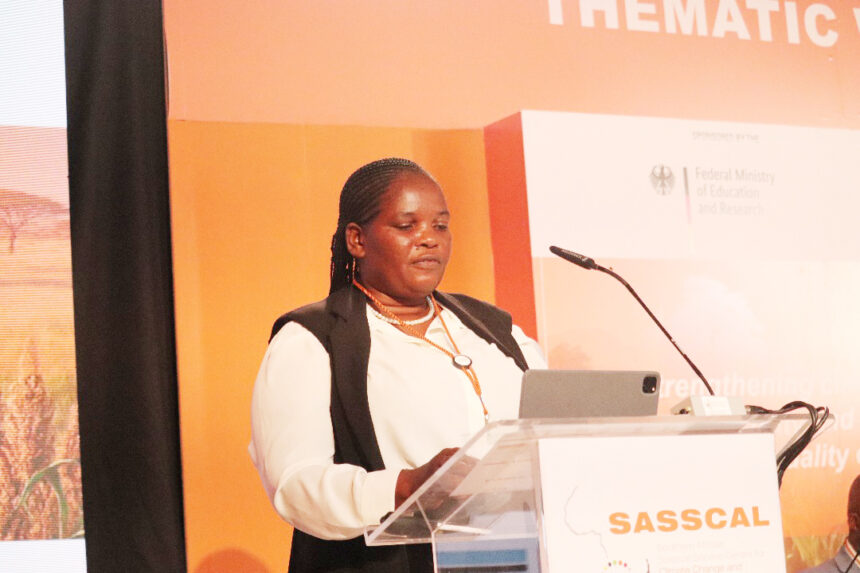Rudolf Gaiseb
Namibia remains one of the driest countries in sub-Saharan Africa, with water scarcity affecting over 60% of the population.
Deputy Minister of Agriculture, Fisheries, Water and Land Reform Ruth Masake says adaptive and science-based solutions to climate challenges are just not necessary, but urgent.
She spoke yesterday at the Southern Africa Science Service Centre for Climate Change and Adaptive Land Management (SASSCAL) 2.0 research programme workshop in Windhoek.
“Namibia continues to experience increasing climate variability, ranging from severe droughts to extreme rainfall, flash floods and outbreaks of pests and diseases. Just last year, our former president declared a State of Emergency due to prolonged drought, which caused widespread crop failure, water shortages and the depletion of natural resources. More recently, torrential rains led to destructive flooding in various regions, while locust infestations in the Zambezi region posed further threats to food security,” she stated.
She highlighted Namibia is progressing through the SASSCAL 2.0, the research programme rolled out in 2022 and ending in 2026.
“Through this phase, Namibia continues to play a pivotal role in coordinating and implementing research projects, particularly in the critical areas of water and food security, valued at EUR 2.8 million, equivalent to approximately N$59 million at the current exchange rate,” she said.
“As we work collectively toward the Sustainable Development Goals (SDGs) and Africa’s Agenda 2063, SASSCAL’s role in promoting science-based solutions and regional cooperation becomes increasingly vital,” she added.
Moreover, under the SASSCAL 1.0 Research Portfolio, which ran from 2012 to 2018, Namibia successfully executed 18 national tasks with a total investment of approximately EUR 1.8 million [N$60.3 million].
SASSCAL aims to strengthen the region’s capacity to generate and utilise scientific knowledge for better decision-making, particularly regarding climate change and management.
The initiative is a collective of six countries, Angola, Botswana, Namibia, South Africa, Zambia and Germany.
It addresses key areas including biodiversity, ecosystem health, forestry and food security.
She indicated that during SASSCAL 1.0, Namibia received 64 automatic weather stations, which have significantly improved national climate monitoring capacity.
“In 2024, SASSCAL secured an additional EUR 2.9 million to upgrade and maintain 44 stations across the country, benefiting a broad spectrum of stakeholders, from farmers to meteorological experts,” she added.
Namibia was the first country to sign and ratify the SASSCAL Treaty, followed by Zambia.
Namibia urges other member states to complete their ratification processes to help elevate SASSCAL to the status of an international organisation, strengthening its governance and global standing.
Furthermore, the Graduate Studies Programme in Integrated Water Resources Management, hosted by the Namibian University of Science and Technology (NUST), welcomed its first intake of 13 PhD students in 2022, and three are Namibians.
The programme is expected to evolve into a regional centre of excellence in water resource management.
The deputy minister also commended SASSCAL for championing green hydrogen development.
The accompanying Namibian Youth for Green Hydrogen Scholarship Programme has so far funded 70 students in its first cohort and 78 in the second, studying at institutions such as the International University of Management, Namibia University of Science and Technology, University of Namibia, and Technical and Vocational Education Training colleges.
SASSCAL 2.0 has supported eight national research projects and awarded scholarships to 34 Namibian students pursuing Honours, Master’s, and PhD degrees. Across all member states, the number of beneficiaries has reached 104 students since 2022.
SASSCAL programme coordinator, Panduleni Hamukwaya, underscored that the SASSCAL Namibia Node is the hub for enabling and supporting national research and stakeholder communities to interact with SASSCAL regional and international efforts in climate change, capacity development and demand-driven science service provision.
“We have witnessed the remarkable progress and growing impact of this regional institution, especially in supporting research activities and capacity-building for evidence-based decision-making and data-driven solutions to our most pressing environmental challenges,” he said.



